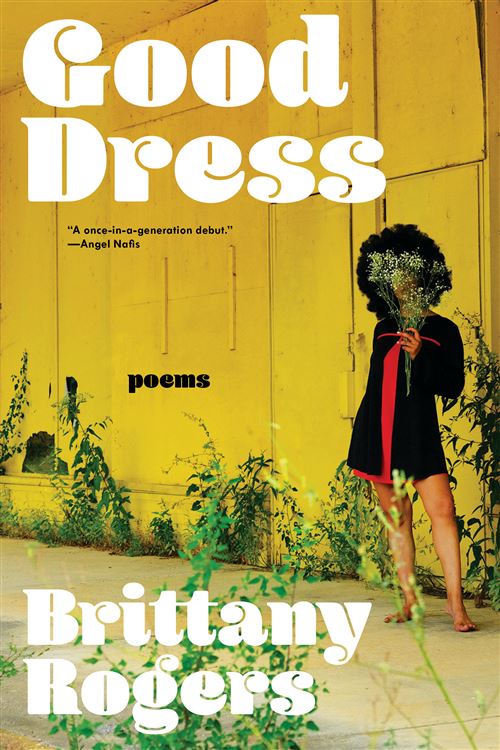Review: She, and her poems, super fine
Tahirah Walker / InReview
My soul has its own sort of detector for radiant poetry. The poetry of Joy Priest, Donika Kelly, Camille Rankine, Khadija Queen and, of course, Yona Harvey bling through my mind anytime I think about what it means for a Black woman to flex poetic.
I have been savoring these flashes since I was a little girl wandering around the Newark Public library, and the librarian with the orange fro insisted that what I really needed was to sit down and get into “Cotton Candy on a Rainy Day,” by Nikki Giovanni. The librarian was right. And Giovanni was right on time.
As I opened “Good Dress” and slipped deep into the world Brittany Rogers spins up for us, I was immediately transported back to that moment 40 years ago. And I knew that “Good Dress” was an exact fit, the same way I knew that the Giovanni collection was right on time. What Rogers has created here is an elixir. It is the antidote for the barrage of messages and anti-messages we get on a second-by-second basis concerning who Black women are or should be as we grow in the communities we have inherited.
“Good Dress” honors the roots of Black womxnhood identity and community, from the soul of Great Migration stories to the bass of Flo Milli raps. The journey Brittany Rogers’ amazing collection of poetry takes — through gardens of Alabama, garage roofs in Detroit and the underwhelming parking lot where the 328 Macomb home of Elizabeth Denison Forth once stood — is spectacular.
Denison Forth, a freedom seeker who upon release from enslavement became one of the first Black woman homesteaders in Michigan, carving out space for herself and declaring herself free, should indeed have a more imaginative shining light upon it. Now, thanks to Rogers, it does. The Detroit artist and poet focuses her attention tenderly on this and many other bold beauties.
From the pews to the avenues, Brittany Rogers declares her own freedom and presence. She busts the rhetorical space wide open for every Black woman she has ever wanted to be, be with or bemoan. This book is “rows and rows of gold pendants” forcing us to look at and remember the beauty and the pain, the mundane and the extraordinary, the progress and the paradox that is Black womxnhood.
In every poem there are layers of phrasing and scene creation that astound. In “Hunting Hours,” she gives us “hickeys red ants lining my neck.” In “Doin’ Too Much” it’s that it ain’t a flex if “his watch ain’t thick as firewood.” And “What’s love if your face isn’t encased in a necklace long as spite?”
Her poem “Good Ground” anchors the collection like a classic Motown bassline. And her words said to me that my Newark childhood and half a lifetime in Pittsburgh were accounted for in a beating heart of Detroit where “makeshift cousins” are jewels.
Pittsburgh, feel free to add a “t” for “cousints” if you want to understand just how clearly and magnificently Brittany Rogers tells you where, what and who she is from. I am particularly in love with the way she uses form and arrangement to build the voice of “Good Dress.” The way “I Lost My Virginity after Making a Pact — ‘To Become Women’ with My Cousins” opens and splays among two pages. The aubade for the changing season is flawlessly lyrical.
I thoroughly enjoyed Rogers’s captivating use of pantoum form in “Ode to My Mama and ‘The Purple Dress’ Circa 1992-1993.” This is a poem that reflects on how a person considers the womanhood of a mother morphing and changing through sexuality, child bearing, and the imagining of the body over time.
It is at once an object poem and a poem that asks us to consider the rhythms and nuances of objectification. The call and response of the longstanding Malaysian form is absolutely perfect for this piece, offering the reverberation between daughter and mother, youth and maturity, the before and the now.
In any case, her “mama know she fine,” and Brittany Rogers better know this book is super fine. Purple dress fine. Lil’ Kim and Aaliyah fine. And exactly on time.
Tahirah J. Walker is a writer and teacher living in the Pittsburgh area.
